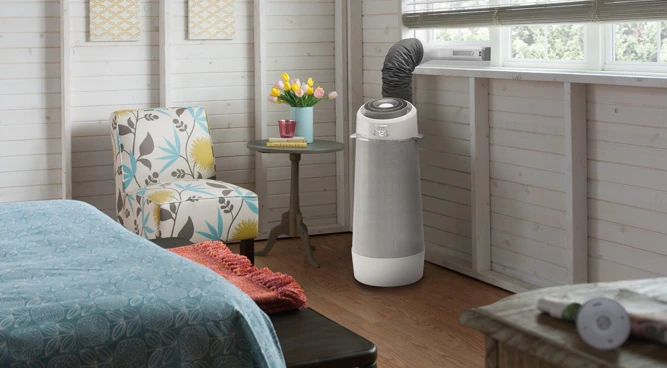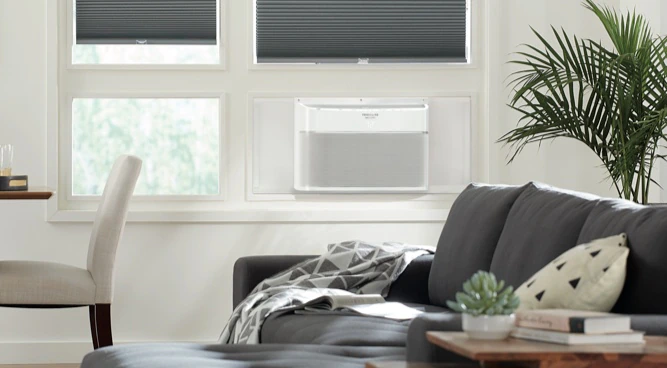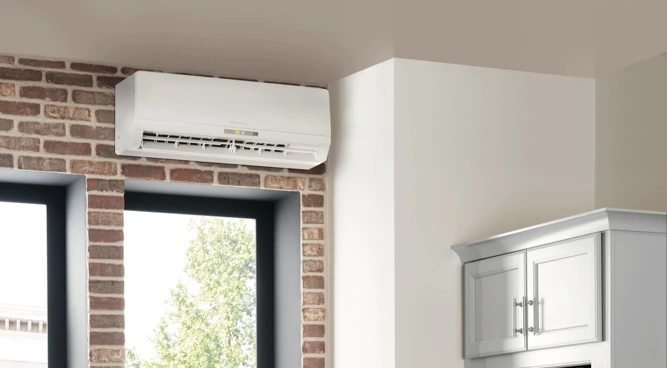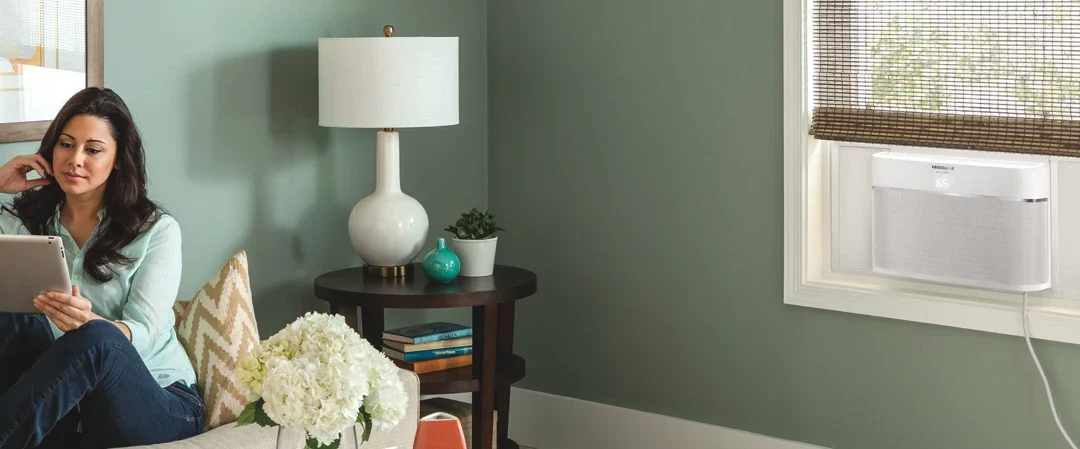See the original post here: https://www.frigidaire.com/Blog/Product-Advice–Education/Air-Conditioner-Types/
Choosing the right air conditioner for your home can be an overwhelming experience. With so many factors and types of units to consider, it can be difficult to know where to start. Thankfully, Frigidaire knows a thing or two about cooling systems.
In fact, Frigidaire invented the first commercially successful room air conditioner in 1929, transforming what it means to be comfortable in your own home. And today, we’re still transforming room cooling with smart air conditioners and seamless designs.
Whether you’re looking to cool a room, office space or an entire home, start here with a comprehensive guide to choosing and purchasing the right air conditioner.
Exploring the Different Types of A/C Units
Knowing your options is an important first step in selecting the right air conditioner. Each type of A/C unit has its benefits and works best in certain locations. Explore the different types of cooling units for homes and decide which will be the best fit for you.

Portable Air Conditioners
The portable A/C, also known as a spot cooler, is a popular choice for those looking for convenience and versatility. Portable air conditioners are freestanding units that provide cooling for a specific room or area. Most include wheels to allow you to easily move them from room to room, but they do require a place to vent the system’s exhaust, such as a window, wall hole or drop ceiling.
The benefits of a portable A/C unit include:
- Easy installation. There’s no need to hire a professional contractor to install a portable air conditioner. Units come with an exhaust hose, window kit and wheels, so you can easily take the cool air from room to room all by yourself.
- Energy efficiency. Though most units come with an Energy Efficiency Rating (EER) of 10 or lower, a portable A/C unit may be an efficient choice for your room. Instead of cooling the entire home or building, use a portable air conditioner to only cool the area being used, saving energy and money.
- Price. Frigidaire portable air conditioning units are a cost-effective option compared to purchasing multiple window units or a central air conditioning system to cool several areas of your home.
Choose a portable air conditioner for rooms that lack proper ventilation or poor air circulation, such as a bedroom, garage or server room. Portable A/C units are also an excellent choice if you prefer a less-permanent cooling solution, as opposed to a built-in or central cooling system.

Window Air Conditioners
A window A/C unit is a self-contained cooling system that is installed inside a standard double-hung window to cool a specific room or area of the home. The cool air return system faces inside, while the hot air exhaust system faces outside. Units come with an installation kit that includes adjustable side curtains to seal off any extra space between the unit and the edge of the window.
The benefits of a window air conditioning unit include:
- Energy efficiency. You can find window A/C units that are Energy-Star certified, designed for maximum energy output with minimal input. These units often include greater temperature controls, such as digital thermostats, programmable timers and automatic cooling modes as well as an EER of 10 or higher.
- Affordable cost. Window air conditioners can be an affordable option for cooling a room. But most of the savings come from operating costs, which are significantly lower than running a central air conditioning system.
- Small footprint. Unlike many room air conditioners, window units do not take up any floor or wall space, so you can reduce visual clutter in your home. Plus, its compact design allows it to fit most window sizes.
- Easy installation. Though installation is slightly more complex than a portable air conditioner, a window A/C unit can still be set up without a professional. Step-by-step instructions are included, and Frigidaire’s support is always available if you have any questions.
Choose a window air conditioning unit when you need to cool a single room instead of an entire home or building, such as an apartment, dorm room or small office.
Built-In Air Conditioner
A built-in A/C, also known as a thru-wall or through-the-wall air conditioner, is very similar to a window unit. However, instead of sitting in the window, through-wall units are installed into an exterior wall, using a wall sleeve for support. Built-in air conditioners only vent warm air through the back of the unit and not from the sides, so window and wall units are not interchangeable.
The benefits of a through-the-wall air conditioner include:
- Energy efficiency. Built-in air conditioners tend to be slightly more efficient than window units because they create an airtight seal for the room. Thru-wall air conditioners come with ENERGY STAR certifications as well as an EER of 10 or higher.
- Permanent installation. If you are looking for a more permanent cooling solution, a built-in A/C can keep temperatures comfortable year-round. Built-in units need an external wall free from plumbing and electrical structures and wiring with specific voltage requirements.
- Unobtrusive design. Choose a through-the-wall A/C to cool your room without taking up much-needed floor space or blocking windows. These A/C units can be built flush with the wall so that they don’t protrude into the room.
Choose a built-in air conditioner for rooms that need permanent temperature solutions year-round, or for rooms where you do not want to block the light or views from your window.

Ductless Split System Air Conditioners
A ductless mini-split A/C is a quiet, efficient way to cool multiple areas of the home without central cooling or self-contained units. The ductless air conditioner includes a large condenser unit that is installed outdoors and one or more wall-mountable blower units that are installed in different zones around the home. Insulated conduit with refrigeration lines runs between the outside and inside components to provide comfortable cooling.
The benefits of a ductless mini-split system include:
- Temperature control. Installing multiple blower units gives you the ability to control the temperature in each zone or room. This allows you to only cool the areas of your home that you use and save in energy costs.
- Energy efficiency. Lookout for each unit’s Seasonal Energy Efficiency Ratio (SEER) or EER to determine its efficiency rating. The U.S. Department of Energy (DOE) requires a SEER rating of 14 or above. Mini-splits can also be ENERGY STAR certified to contribute additional energy savings.
- No ductwork. The “ductless” split systems obviously do not use ducts, which can lead to loss of performance and efficiency because of leaks, cracks or disconnections.
- Quiet operation. Because the compressor of a split A/C is located outside the house, the only indoor noise comes from the unit’s fan, making it quieter than a window or thru-wall air conditioner.
Choose a ductless split system air conditioner for cooling multiple rooms in a home, restaurant or small office. Mini-split systems are also a great option for rooms without windows.
Package Terminal Air Conditioners (PTACs)
A PTAC unit is a commercial-grade air conditioner capable of cooling and heating spaces of almost any size. Typically found in hotels, assisted living facilities and offices, PTACS are usually installed under windows and through exterior walls.
The benefits of a PTAC include:
- Simple, customized temperature control. Easy-to-use controls allow occupants to customize the temperature settings of each room to their own level of comfortability.
- Durable design. Many PTAC units come with corrosion guards to extend the operation life of the investment, especially in coastal regions. Plus, Frigidaire’s reputation for durability and easy maintenance means you’re receiving the highest-quality performance.
- Quiet operation. Because PTACs are often used in bedrooms, they operate at lower decibel levels and come in a sound reduction package to prevent disruptions.
Choose a PTAC for an apartment space, sunroom and other single-room heating and cooling.

